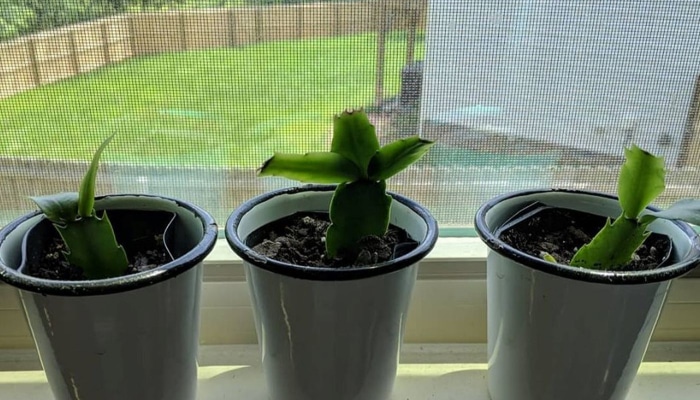By Laura Simon
On Tuesday, I finally got around to my usual Monday task: watering the plants. For some reason, the number of plants in my house keeps multiplying, as if I don’t have enough work keeping three kids watered and fed.
My kitchen windowsill features three tiny, potted Christmas cacti. In October, each of my children planted a single starter leaf during a field trip to Reynolda Gardens. Each leaf came from the same starter plant, and each leaf was planted in the same topsoil with the same general lack of care and gentleness that you would expect from a young child who has just seen a snake in the greenhouse.
For the past seven months, all three plants have perched in a row next to the sunniest window in my house. I water them all at once, on the same day. I say nice things to them, because apparently that’s what we do now. (It’s fairly easy…not one of the plants has talked back yet.)
I suppose I thought that plants of the same species would grow the same way, but they haven’t. One plant immediately put on three new leaves, all from the original. Another plant put on one leaf, then another, in a long chain. The third produced a blossom, then thought long and hard about its next steps. I was just starting to get worried when it added two leaves at the same time. Seven months out, all three plants have different sizes and shapes, but they are all thriving.
I couldn’t help but think about those plants as I updated our family growth chart after the kids’ afternoon well-check visits. I expected that they would pretty much follow the same growth pattern, but from year to year, they leapfrog back and forth. At birth, my youngest had a half-inch advantage. At age three, my middle son was by far the tallest. My oldest grew three inches last year; the other two only grew two. Their growth spurts have fallen at different ages. You really can’t make a total generalization, such as which kid is big or little for his age, without the growth chart revealing that you don’t know a thing. Even when all other characteristics are kept the same, it turns out that growth is a very individual endeavor.
I say that because we live in a society that loves to draw arbitrary lines in the sand, declaring that we MUST meet these particular milestones at particular times in order to be normal. Those lines apply to everything, from when we walk to when we drive to when we have children or move into our dream house. The problem is that the normal doesn’t exist.
I get the need for developmental screenings, because I’ve seen firsthand that early intervention can help when there’s a problem or concern. But our collective timetable can do a lot of harm, too.
For instance, nighttime potty training can naturally happen between age 2 and 9. That’s a pretty big difference, if you ask me, and one of my kids mastered it a 2.5. Another mastered it just shy of his ninth birthday. The one who waited a long time was starting to feel some big anxiety, even though we constantly reminded him that he was still very much normal.
In our household, first steps ranged from 7 months to 16 months. Watching my kids now, I’m quite certain you couldn’t tell me which kid was early and which kid was late. The oldest was one of the 16-month’ers, and he just ran his first 5K in 29 minutes. He’s 9. I think I broke 30 minutes in a 5k when I was 38. But when his little friends were walking and I was still carrying my 16-month-old everywhere, I was pretty worried.
Reading works the same way, and I can personally attest that the age at which you master reading does not serve as a predictor of future success at all.
For my 4-year-old, everything in life is a race. She cries ALL THE TIME because she didn’t win the race that wasn’t a race. Last kid to put on her seat belt? Tears. Last kid to finish her food? Tears. Just discovering that she can’t ever catch up to her brothers’ ages? So. Many. Tears. In an effort to bring down the level of drama, I’m constantly reminding her that you can’t win a race if there isn’t one. She doesn’t buy it.
Life actually isn’t a race, though, and we can drive ourselves and our kids crazy trying to keep up. Please consider this your permission to give yourself and your kids a break. The rate at which our kids achieve milestones will not unnecessarily predict future success, and comparison is the thief of joy.
Here’s to taking our joy back, and letting our kids move forward at their own pace. Burn the report card and feel free to join me.
Want to see more blogs like this and get notifications on local events in the Triad? Subscribe to TMoM’s free weekly newsletters here.

















I needed this today, thank you ❤️
THIS WAS GREAT!! thanks!!
I just love everything about this! 💕
Such a great reminder, Laura! And beautifully written as always!